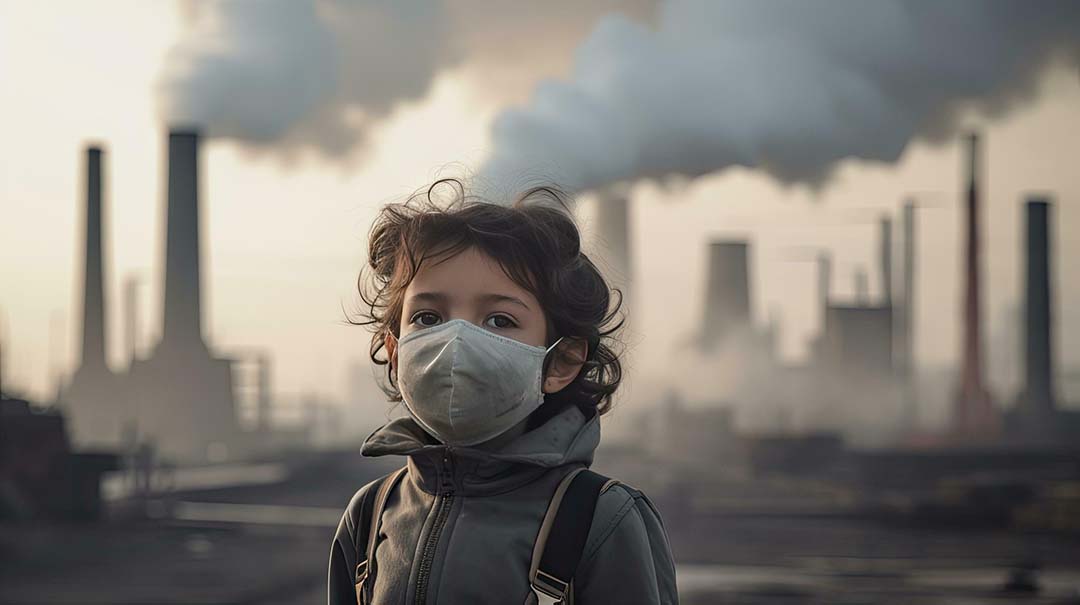Introduction
In many Iranian cities, air pollution has become a recurring crisis during autumn and winter. Children are among the most vulnerable groups — their developing lungs, weaker immune systems, and high activity levels make them more susceptible to harm.
School closures, restricted outdoor activities, and rising parental concerns highlight how families must take an active role in protecting their children.
This article explains how parents can maintain their children’s physical and emotional health on polluted days through proper nutrition, indoor activities, and effective home ventilation.
Why Children Are More Affected by Air Pollution
- Faster breathing: Kids inhale more air relative to their body size, allowing more pollutants to enter their lungs.
- Weaker immune systems: Their defenses are still developing.
- More activity: Children spend more time running and playing, increasing exposure.
- Sensitive lungs: Repeated contact with pollutants can interfere with lung growth.
The Role of Nutrition in Protecting Children
1. Fruits and Vegetables Rich in Antioxidants
Examples: Oranges, kiwis, pomegranates, carrots, and broccoli.
→ Antioxidants help reduce the impact of free radicals produced by pollution.
2. Milk and Dairy Products
- Milk may help the body eliminate certain toxins.
- Yogurt and buttermilk are rich in probiotics that strengthen immunity.
3. Nuts and Seeds
- Walnuts, almonds, and hazelnuts are rich in omega-3 fatty acids, which help reduce inflammation.
4. Plenty of Water
- Keeps the throat and airways moist and helps flush out toxins.
5. Avoid Processed Junk Foods
- Industrial snacks, chips, and sugary drinks weaken the immune system.
Home Air Quality and Ventilation
1. Use an Air Purifier
- A HEPA filter is most effective for removing fine particles.
- Choose a model suitable for the size of your home.
2. Natural Ventilation
- Open windows during low-traffic hours (e.g., midday).
- Allow fresh air circulation to reduce indoor pollutant buildup.
3. Reduce Indoor Pollution Sources
- Avoid cigarette smoke and scented candles.
- Limit use of sprays and chemical cleaners.
4. Air-Purifying Plants
- Plants like snake plant (Sansevieria) and aloe vera can improve air quality.
- Note: they complement — not replace — proper ventilation.
Indoor Activities for Polluted Days
- Board and card games to reduce screen time.
- Light exercise such as stretching or children’s yoga.
- Crafts, painting, and storytelling to reduce stress and encourage creativity.
Emotional Support for Children
Polluted days and repeated school closures can cause boredom or anxiety in kids.
Parents should:
- Talk calmly about the situation and explain it in simple terms.
- Provide reassurance and keep routines stable.
- Engage in shared activities to make children feel secure and connected.
Parents as Role Models
- Follow health precautions and wear masks outdoors.
- Model healthy eating habits in front of children.
- Stay calm and organized to prevent passing stress to them.
Conclusion
Families are the first and most important line of defense in protecting children from the harmful effects of air pollution. By ensuring nutritious diets, clean indoor air, and positive, engaging home activities, parents can safeguard their children’s physical health and emotional well-being even during polluted days.
Frequently Asked Questions (FAQ)
1. What foods help reduce the effects of air pollution?
Fruits rich in vitamin C — such as oranges and kiwis.
2. Is an air purifier necessary?
Yes, especially for families living in highly polluted cities.
3. What home activities help reduce children’s stress?
Storytelling, drawing, and family games.
4. Do indoor plants really clean the air?
Yes, they help — but should be used alongside mechanical purifiers and ventilation.







